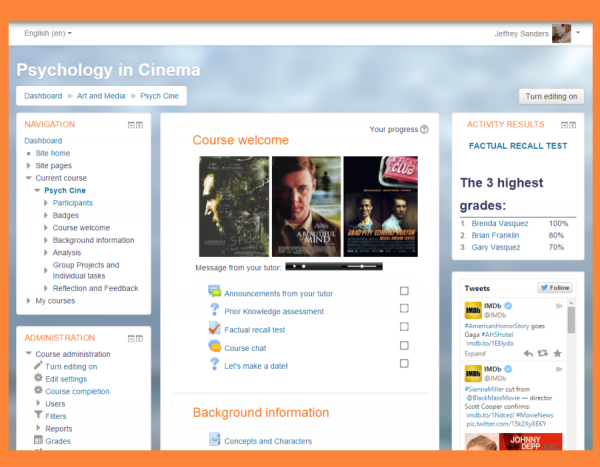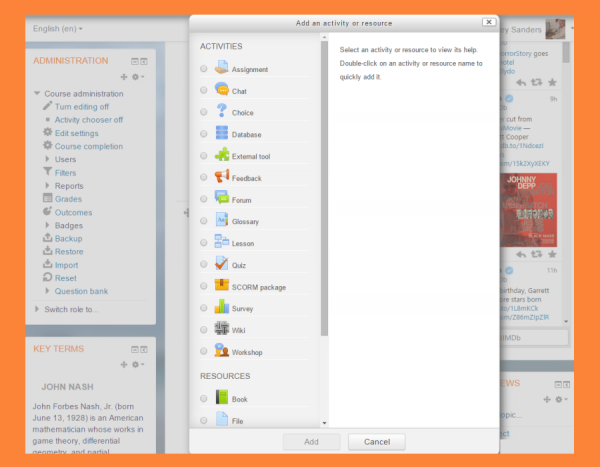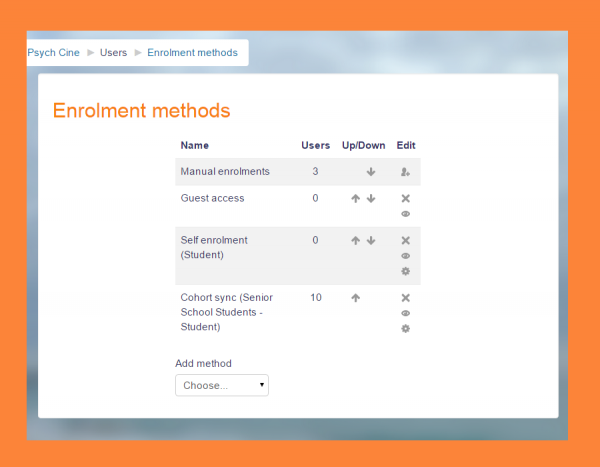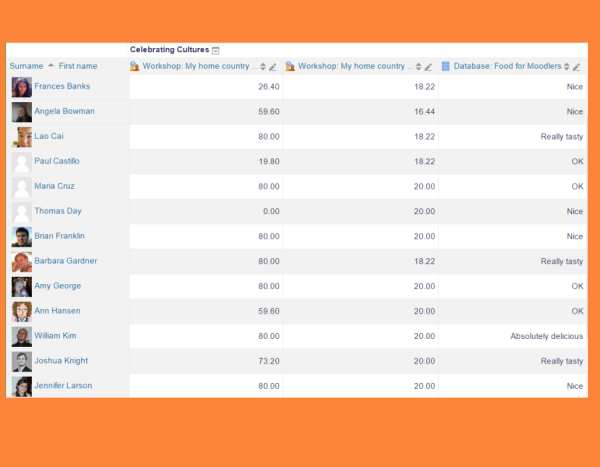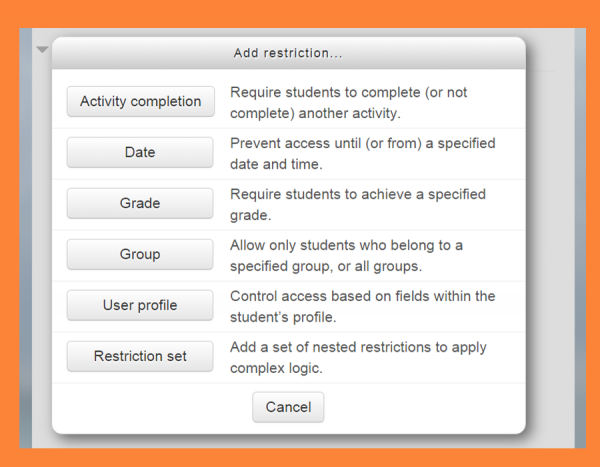Diferencia entre revisiones de «Guía rápida del profesor»
(tidy up) |
(tidy up) |
||
| Línea 1: | Línea 1: | ||
{{Frequently updated doc page | |||
|docpagetitle = Teacher quick guide | |||
}} | |||
{{EnTraduccion}} | {{EnTraduccion}} | ||
En Moodle, un profesor tiene responsabilidad sobre los materiales en su propio curso. Los profesores a menudo gestionan inscripciones (matriculaciones) y pueden cambiar el diseño de la página del curso. Esta guía rápida de inicio introduce las características de Moodle para aquellas personas con el [[Rol de profesor]]. | En Moodle, un profesor tiene responsabilidad sobre los materiales en su propio curso. Los profesores a menudo gestionan inscripciones (matriculaciones) y pueden cambiar el diseño de la página del curso. Esta guía rápida de inicio introduce las características de Moodle para aquellas personas con el [[Rol de profesor]]. | ||
| Línea 7: | Línea 10: | ||
By default a regular teacher can't add a new course. See [[Añadiendo un nuevo curso]] for information on how courses may be created. | By default a regular teacher can't add a new course. See [[Añadiendo un nuevo curso]] for information on how courses may be created. | ||
[[File:tgcoursesetup.png|600px|thumb|center| | [[File:tgcoursesetup.png|600px|thumb|center|Ejemplo de un curso Moodle]] | ||
A course can display its materials in a number of ways or 'formats' for example in weekly sections or (named) topic sections. You can show all the sections at once or just reveal one at a time. See [[Configuraciones del curso]] for more information. or watch the screencast [https://www.youtube.com/watch?v=CNrKtMjQ_8s How to lay out your course]. | A course can display its materials in a number of ways or 'formats' for example in weekly sections or (named) topic sections. You can show all the sections at once or just reveal one at a time. See [[Configuraciones del curso]] for more information. or watch the screencast [https://www.youtube.com/watch?v=CNrKtMjQ_8s How to lay out your course]. | ||
| Línea 15: | Línea 18: | ||
You can also add elements known as 'blocks' to the right, left or both sides of your central learning area (depending on your theme). For more information see [[Bloques]] and the screencast [https://www.youtube.com/watch?v=MLjT_jyJscs What are blocks?] | You can also add elements known as 'blocks' to the right, left or both sides of your central learning area (depending on your theme). For more information see [[Bloques]] and the screencast [https://www.youtube.com/watch?v=MLjT_jyJscs What are blocks?] | ||
== | ==Añadir materiales educativos== | ||
While Moodle can be used for displaying course materials, it is most effective when students can engage with each other and their teacher.Moodle calls static materials such as word processed documents and presentations [[Recursos]] and more interactive and graded tasks [[Actividades]] The activities available may vary according to what your administrator has enabled in your site and may include non-standard activities installed as extra plugins. | While Moodle can be used for displaying course materials, it is most effective when students can engage with each other and their teacher.Moodle calls static materials such as word processed documents and presentations [[Recursos]] and more interactive and graded tasks [[Actividades]] The activities available may vary according to what your administrator has enabled in your site and may include non-standard activities installed as extra plugins. | ||
| Línea 21: | Línea 24: | ||
Files and folders can be uploaded via drag and drop as in the screencast [https://www.youtube.com/watch?v=z70iLDWqoGA Dragging and dropping files into Moodle] or via the [[Selector de archivos]] as the screencast [https://www.youtube.com/watch?v=KbvhBeeuM4I Uploading files into Moodle] demonstrates. The documentation [[Trabajando con archivos]] gives more information on how to add different types of files as resources to your course. | Files and folders can be uploaded via drag and drop as in the screencast [https://www.youtube.com/watch?v=z70iLDWqoGA Dragging and dropping files into Moodle] or via the [[Selector de archivos]] as the screencast [https://www.youtube.com/watch?v=KbvhBeeuM4I Uploading files into Moodle] demonstrates. The documentation [[Trabajando con archivos]] gives more information on how to add different types of files as resources to your course. | ||
[[File:tglearningmaterials.png|thumb|center|600px| | [[File:tglearningmaterials.png|thumb|center|600px|Selector de actividades]] | ||
When the editing is turned on, Moodle's Activity chooser offers resources and activities for the teacher to select. Clicking on a button displays information about the features of any particular activity so you can see if it meets your needs. For more details, watch the [https://www.youtube.com/watch?t=12&v=yWo0o4tG9YQ Activity chooser] screencast. | When the editing is turned on, Moodle's Activity chooser offers resources and activities for the teacher to select. Clicking on a button displays information about the features of any particular activity so you can see if it meets your needs. For more details, watch the [https://www.youtube.com/watch?t=12&v=yWo0o4tG9YQ Activity chooser] screencast. | ||
| Línea 27: | Línea 30: | ||
Standard activities include [[Foro]], [[Glosario]] and [[Examen]] (Cuestionario) Students may submit work to an [[Tarea]] or give their opinions in a customisable [[Retroalimentación]]. The full list of standard activities is here: [[Actividades]]. | Standard activities include [[Foro]], [[Glosario]] and [[Examen]] (Cuestionario) Students may submit work to an [[Tarea]] or give their opinions in a customisable [[Retroalimentación]]. The full list of standard activities is here: [[Actividades]]. | ||
== | ==Inscripción al curso== | ||
Before a learner can access your course, they must first be [[Autenticación| autenticados en el sitio]] and that is the responsibility of the Site administrator. | Before a learner can access your course, they must first be [[Autenticación| autenticados en el sitio]] and that is the responsibility of the Site administrator. | ||
[[File:tgcoursenrolment.png|thumb|center|600px| | [[File:tgcoursenrolment.png|thumb|center|600px|Métodos de inscripción]] | ||
There are several [[Métodos de inscripción]] available to a teacher. What is available again depends on the Moodle administrator. The admin might enrol students into course automatically, or the teacher might be able to enrol students from ''Course administration > Users >Enrolled users''. This is the [[Inscripción manual]] method. Other options can be seen in ''Course administration > Users > Enrolment methods'' and include [[Auto inscripción]] and [[Acceso de invitado]]. Note that guests can only view the course and its resources; they cannot participate in any activities. | There are several [[Métodos de inscripción]] available to a teacher. What is available again depends on the Moodle administrator. The admin might enrol students into course automatically, or the teacher might be able to enrol students from ''Course administration > Users >Enrolled users''. This is the [[Inscripción manual]] method. Other options can be seen in ''Course administration > Users > Enrolment methods'' and include [[Auto inscripción]] and [[Acceso de invitado]]. Note that guests can only view the course and its resources; they cannot participate in any activities. | ||
An enrolment key may be set if [[Auto inscripción]] is enabled so that only students with the key can enter. The screencast [[https://www.youtube.com/watch?v=N74A_ZITL6U How learners access your course]] gives more information on course enrolment. | An enrolment key may be set if [[Auto inscripción]] is enabled so that only students with the key can enter. The screencast [[https://www.youtube.com/watch?v=N74A_ZITL6U How learners access your course]] gives more information on course enrolment. | ||
== | |||
==Calificar== | |||
Every course in Moodle has its own [[Libro de calificaciones]] which records scores from [[Tarea|tareas]] , [[Examen|exámenes]] , [[Taller|talleres con evaluación por pares]], [[Lección|lecciones con ramificaciones]] and [[Herramienta externa|Recursos educativos LTI]]. | Every course in Moodle has its own [[Libro de calificaciones]] which records scores from [[Tarea|tareas]] , [[Examen|exámenes]] , [[Taller|talleres con evaluación por pares]], [[Lección|lecciones con ramificaciones]] and [[Herramienta externa|Recursos educativos LTI]]. | ||
| Línea 45: | Línea 49: | ||
Grade items can be manually created from ''Course administration>Grades>Set up>Categories and items'' and it is also possible to [[Importar calificaciones|importar]] and [[Exportar calificaciones|exportar]] calificaciones. | Grade items can be manually created from ''Course administration>Grades>Set up>Categories and items'' and it is also possible to [[Importar calificaciones|importar]] and [[Exportar calificaciones|exportar]] calificaciones. | ||
== | ==Monitoreo del progreso== | ||
If [[Finalización de actividad|seguimiento de la finalización]] has been enabled for the site and in ''Course administration > Edit settings'', you can then set completion conditions in activity settings. A checkbox will appear next to the activity and a student may either be allowed to tick it manually, or a tick will display once criteria for that particular activity have been met. This feature can be combined with [[Finalización del curso]] so that when certain activies have been completed and/or grades obtained, the course itself is marked complete. | If [[Finalización de actividad|seguimiento de la finalización]] has been enabled for the site and in ''Course administration > Edit settings'', you can then set completion conditions in activity settings. A checkbox will appear next to the activity and a student may either be allowed to tick it manually, or a tick will display once criteria for that particular activity have been met. This feature can be combined with [[Finalización del curso]] so that when certain activies have been completed and/or grades obtained, the course itself is marked complete. | ||
| Línea 53: | Línea 57: | ||
[[Insignias]] can also be issued, manually or based on completion criteria to act as a motivator and record of course progress. | [[Insignias]] can also be issued, manually or based on completion criteria to act as a motivator and record of course progress. | ||
== | ==Restricción del acceso== | ||
A Moodle course can be set to display everything to everyone all the time, or it can be very restrictive, displaying certain items at certain times, to certain groups or based on performance in previous tasks. | A Moodle course can be set to display everything to everyone all the time, or it can be very restrictive, displaying certain items at certain times, to certain groups or based on performance in previous tasks. | ||
| Línea 60: | Línea 64: | ||
Course items and sections may be manually hidden using the 'hide' icon when the editing is turned on. If [[Actividades condicionales]] have been enabled by the administrator then a Restrict access section will display in each course activity and resource, allowing you to choose how and when this item will be revealed, and whether to hide it completely or show it greyed out with the conditions for access. | Course items and sections may be manually hidden using the 'hide' icon when the editing is turned on. If [[Actividades condicionales]] have been enabled by the administrator then a Restrict access section will display in each course activity and resource, allowing you to choose how and when this item will be revealed, and whether to hide it completely or show it greyed out with the conditions for access. | ||
[[Categoría:Guía rápida]] | [[Categoría:Guía rápida]] | ||
[[en:Teacher quick guide]] | [[en:Teacher quick guide]] | ||
Revisión del 15:21 20 oct 2015
Nota: Esta es una traducción de una página de la documentación en idioma Inglés (Docs), que se considera particularmente importante, y que en su versión original se actualiza frecuentemente. Por ello, se le recomienda que revise la página original en idioma inglés: Teacher quick guide.
En Moodle, un profesor tiene responsabilidad sobre los materiales en su propio curso. Los profesores a menudo gestionan inscripciones (matriculaciones) y pueden cambiar el diseño de la página del curso. Esta guía rápida de inicio introduce las características de Moodle para aquellas personas con el Rol de profesor.
Configuración del curso
A course is a space on a Moodle site where teachers can add learning materials for their students. A teacher may have more than one course and a course may include more than one teacher and more than one group of learners. See the screencast What is a course?
By default a regular teacher can't add a new course. See Añadiendo un nuevo curso for information on how courses may be created.
A course can display its materials in a number of ways or 'formats' for example in weekly sections or (named) topic sections. You can show all the sections at once or just reveal one at a time. See Configuraciones del curso for more information. or watch the screencast How to lay out your course.
Course sections may be renamed by turning on the editing and clicking the configuration icon underneath the section name. Sections may also be moved by drag and drop and sections added or removed by clicking the + or - underneath the bottom section. See Página principal del curso for more information or watch the screencast on Editing course sections and Understanding the edit icons.
You can also add elements known as 'blocks' to the right, left or both sides of your central learning area (depending on your theme). For more information see Bloques and the screencast What are blocks?
Añadir materiales educativos
While Moodle can be used for displaying course materials, it is most effective when students can engage with each other and their teacher.Moodle calls static materials such as word processed documents and presentations Recursos and more interactive and graded tasks Actividades The activities available may vary according to what your administrator has enabled in your site and may include non-standard activities installed as extra plugins.
Files and folders can be uploaded via drag and drop as in the screencast Dragging and dropping files into Moodle or via the Selector de archivos as the screencast Uploading files into Moodle demonstrates. The documentation Trabajando con archivos gives more information on how to add different types of files as resources to your course.
When the editing is turned on, Moodle's Activity chooser offers resources and activities for the teacher to select. Clicking on a button displays information about the features of any particular activity so you can see if it meets your needs. For more details, watch the Activity chooser screencast.
Standard activities include Foro, Glosario and Examen (Cuestionario) Students may submit work to an Tarea or give their opinions in a customisable Retroalimentación. The full list of standard activities is here: Actividades.
Inscripción al curso
Before a learner can access your course, they must first be autenticados en el sitio and that is the responsibility of the Site administrator.
There are several Métodos de inscripción available to a teacher. What is available again depends on the Moodle administrator. The admin might enrol students into course automatically, or the teacher might be able to enrol students from Course administration > Users >Enrolled users. This is the Inscripción manual method. Other options can be seen in Course administration > Users > Enrolment methods and include Auto inscripción and Acceso de invitado. Note that guests can only view the course and its resources; they cannot participate in any activities.
An enrolment key may be set if Auto inscripción is enabled so that only students with the key can enter. The screencast [How learners access your course] gives more information on course enrolment.
Calificar
Every course in Moodle has its own Libro de calificaciones which records scores from tareas , exámenes , talleres con evaluación por pares, lecciones con ramificaciones and Recursos educativos LTI.
Other activies such as foros, bases de datos and glosarios can have ratings enabled which will also then be reflected in the gradebook.
Grade items can be manually created from Course administration>Grades>Set up>Categories and items and it is also possible to importar and exportar calificaciones.
Monitoreo del progreso
If seguimiento de la finalización has been enabled for the site and in Course administration > Edit settings, you can then set completion conditions in activity settings. A checkbox will appear next to the activity and a student may either be allowed to tick it manually, or a tick will display once criteria for that particular activity have been met. This feature can be combined with Finalización del curso so that when certain activies have been completed and/or grades obtained, the course itself is marked complete.
Insignias can also be issued, manually or based on completion criteria to act as a motivator and record of course progress.
Restricción del acceso
A Moodle course can be set to display everything to everyone all the time, or it can be very restrictive, displaying certain items at certain times, to certain groups or based on performance in previous tasks.
Course items and sections may be manually hidden using the 'hide' icon when the editing is turned on. If Actividades condicionales have been enabled by the administrator then a Restrict access section will display in each course activity and resource, allowing you to choose how and when this item will be revealed, and whether to hide it completely or show it greyed out with the conditions for access.
